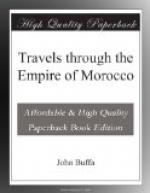After this ceremony, the bridegroom was obliged to retire to the house of his nearest relation, where he continued three days and nights, feasting, and receiving presents from all his male friends, while the bride was paid the same compliments by her female acquaintance. At the expiration of the appointed time, the gentleman returned to his own house.
The Moors are not allowed by their law more than four wives, but they may have as many concubines as they can maintain; accordingly, the wealthy Moors, besides their wives, keep a kind of seraglio of women of all colours.
From their marriages, I am insensibly led to the subject of the burial of their dead. Not that any idea strikes me of an analogy between the situations of a married person, and one consigned to the “narrow house,” as Ossian poetically styles the grave; but from a certain succession of thought, for which one is at a loss to account. In the burial of their dead, they are decent and pious, without pomp or show. The corpse is attended by the relations and friends, chanting passages from the Koran, to the mosque, where it is washed, and it is afterwards interred in a place at some distance from the town, the Iman, or priest, pronouncing an oration, containing the eulogy of the deceased. The male relations express their regard by alms and prayers, the women by ornamenting the tomb with flowers and green leaves. Their term of mourning is the same as ours, twelve months, during which period the widows divest themselves of every ornament, and appear habited in the coarsest attire. Their burial-grounds are inclosed by cypress and other dark lofty trees, the lower parts of which are interwoven with odoriferous shrubs and creeping plants, forming an almost impenetrable hedge. Some of their tombs are very curious, though they exhibit specimens of the rudest architecture. There are also several saints’ houses in their burying-places, which render them doubly sacred; and no Christian or Jew is suffered to enter, on pain of death.
Friday being their Sabbath, the day is kept perfectly holy; all the Moors are employed in prayer, reading the Koran, or visiting the tombs of their departed friends.
Curiosity prompted me to go and see an assemblage of fanatics, at a celebrated saint’s house, in the neighbourhood of this town. They were to perform many wonderful things, such as tearing a live sheep in pieces, and devouring the flesh, fighting with wild beasts, and several other barbarous exhibitions. These people, called in Barbary Free Masons, are nothing more than a set of canting, roaring companions, surcharged with wine and other liquors, and assembled in this holy place, for the sole purpose of giving free vent to their brutal passions. This society is peculiar to itself, having no connexion with our ancient or modern Free Masons. I have however obtained a free access to their saints’ houses and secret meetings, with permission to go any where unmolested; but I always take the precaution to go well armed, and escorted by the Emperor’s guards, as nothing can exceed the barbarous acts of this fanatic set of people.




